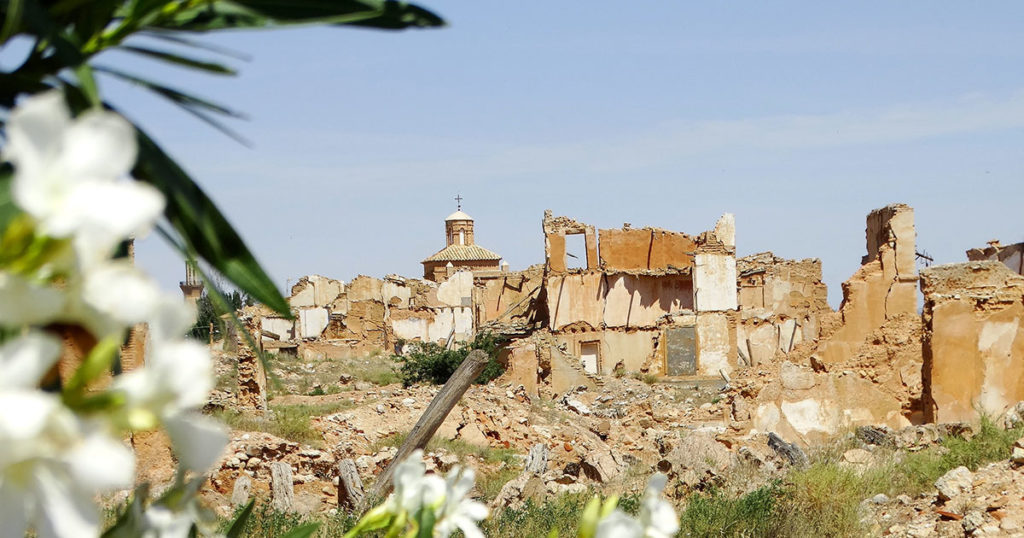
Diminutive matriarch, mother of six, hatless with gray hair pulled into a bun and wearing a black skirt, sweater, and jacket, she stood between her husband and youngest daughter for the family photo. She was in her late 70s at the time but vigilant still and indefatigable, looking straight at the camera, her expression slightly cross, a little suspicious, and somewhat impatient. It was no surprise to me that she lived to be 99, finally abandoning the clan a week short of her 100th birthday. She died with all her teeth, I was told by her grandson, now a grandfather himself, to demonstrate the stern stuff she was made of. All her teeth, and he had never seen her touch a toothbrush, he added. But I remembered the stories of scarcity during and after the Civil War. Maybe the teeth lasted for want of use.
In the late 1960s, she and her husband left their home in a village in Salamanca to live for a year at a time with each of their four grown daughters, all married and settled in the north. First it was the two of them, then just she. My friend remembers her presence with his family more than her absences, as if the year she was with them leaked across the boundaries of her stay, infusing one time with another. He remembers in particular her pithy sayings. Ante el vicio de pedir, el virtud de no dar, she would tell him when as a boy he asked for anything: for the vice of asking, the virtue of refusing. “Is asking a vice?” I wondered aloud, because I often counsel that it doesn’t hurt to ask. My friend answered that it was if you could get what you wanted without asking. He’s someone who prefers to do a favor than have one done him, who seldom asks for help, and who prides himself on needing no one.
The youngest of the grown children in the faded photo is my friend’s mother, in her mid 30s at the time. The eldest is already in his 50s. The spouses and offspring are not included, just the two elderly parents and their six children. These children didn’t seem from another generation so much as from a different world, especially the women with the striped dresses, large buttons, two-tone high-heels, and bouffant hairdos. Nothing about them suggests the dusty village where they spent their childhoods, or the war they lived through and the years that followed, full of deprivations. The daughters are dated. In contrast, the mother is eternal. She stands encased in black, not antiquated but without a bauble or a glimmer of decoration, dressed not for the occasion, which was a wedding, but dressed, period.
She was laid to rest not in the ancestral village where her parents and siblings were buried and she had spent most of her life, but in Asturias because she was living here with a daughter when she died in 1994. At that time few people could afford the luxury of transporting a corpse. Her daughter’s family had space reserved in a niche in the village cemetery, and there she was buried. For the same reason her husband, who had died 20 years earlier, was buried in Bilbao where they had been with a different daughter at the time of his death.
Despite the photo and the stories of her in the varied rooms and towns of her old age, I picture her in her prime, in a flat field in Salamanca, a row of corn and beans behind her, late afternoon, the sun still hot. The war is over, the gnawing fear for your life at the coming of the soldiers is past. But gnawing hunger continues.
A hunk of bread is on the table, saved from lunch, and beside it a carrot and a parsnip in a bowl of broth. Not enough food to fill even one child and she has six. All are hungry again after the one meal they can count on at midday. What there is gets divvied up for dinner, but it’s never enough. Who needs it most? The children line up. She moves from one to another, her hand out, feeling their bellies. No sense in asking if they’ve eaten anything—they’ll all be hungry enough to deny having foraged a handful of berries or a few walnuts or to having stolen an apple from a neighbor’s tree. But she’ll know whose belly is empty and whose lodges a scrap of food.
And the children know not to ask for a bite even, not even a crumb. Though it’s not in the family lore, they’ll know not to whine either. In English, the squeaky wheel gets the grease, and in Spanish the same idea is expressed as Quién no llora, no mama, which translates to the baby who doesn’t cry, doesn’t suckle. But when there’s nothing to suckle and no grease either, screeching is to no avail, for a wheel or a baby.

